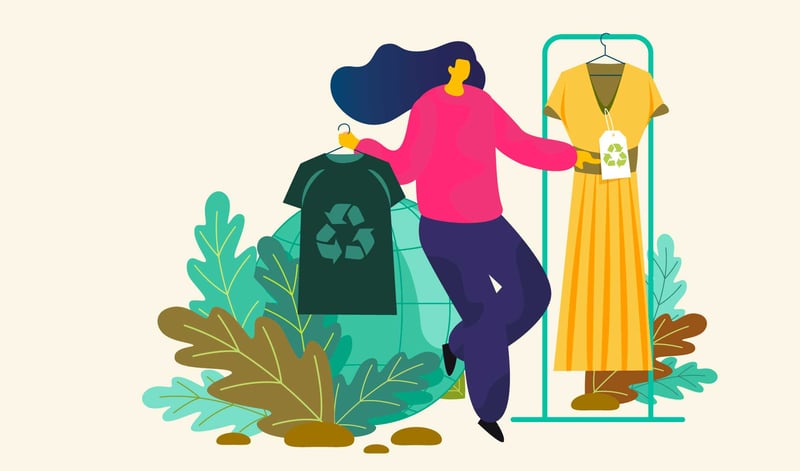The fashion industry is toxic, environmentally and socially.
The production of textiles is responsible for the highest greenhouse gas emissions per unit of material. The fashion industry releases an estimated 10% of annual carbon emissions worldwide. It is the second leading industry consumer of water and a source of 20% of industrial water pollution.

Toxic Truth: It requires 2,000 gallons of water to produce a single pair of jeans.
Resellers are saving the planet by sourcing ethically and recycling secondhand goods. Here are some tips for being more sustainable as a reseller:
1. Source Sustainably
Sourcing sustainably is a great way to help save the planet as a reseller. By sourcing second-hand goods, you are assisting to keep items out of landfills. Landfills are overwhelmed with textiles, much of the same being synthetic materials that take forever to break down, if at all.
Toxic Truth: 11.3 million tons of textile waste end up in landfills each year in the United States alone.
Sourcing secondhand reduces the impact on landfills. When shopping for these new items, avoid sourcing “fast fashion” brands. Fast fashion companies have a high turn-around, low-cost trendy clothing, and accessories, created to maximize profit without regard to the environment, waste, emission, and human labor. Often, this clothing is made of poor-quality materials that are not meant to last.
Avoid Fast Fashion
Fast fashion companies are responsible for much of the textiles in landfills, a vast level of pollution, and exploitation of human labor. The devastation produced by the fashion industry spans from the bottom of the ocean to the top of the ozone layer, with detrimental effects on ecosystems and animal welfare. While that super trendy top from Shein might only cost $4.99, there is a much higher price for the environmental impact and the poor treatment of the children who made it.
In 2018, the United States Department of Labor found that child labor was exploited in the production of clothing in Argentina, Bangladesh, the Philippines, Turkey, Brazil, China, Indonesia, Vietnam, and more countries. Many fashion brands export production overseas due to cheap labor, tax benefits, and lenient regulations as they relate to pollution, operation, and labor. Undeveloped countries do not necessarily have advanced regulations regarding pollution, labor, safety, and fair wages. Fast fashion companies take advantage of such leniency and manufacture in places where they can minimize expenses and maximize profit. Unfortunately, there is a maximized expense on the environment and humanity. Fast fashion is detrimental to the planet and human rights.
Toxic Truth: Approximately 80% of apparel is made by women between the ages of 14-24.
Lend your support to ethical companies and suppliers that pay their employees fair wages and produce quality products with a longer lifespan. Do your research and learn about the companies and brands you wish to support. There are many brands, such as Coach, who are doing their part to help the environment and world through funding ecological foundations, human rights associations, charitable efforts, and scholarship programs.
2. Recycle & Reduce Waste
Of course, recycling materials and reducing waste should be a top priority in your reselling business. There are many little steps you can take that make a huge difference for the planet.
Consider going paperless to the extent possible. Take paperless notes on a small whiteboard or a digital app or program, and use an electronic planner and calendar. Opt to go paperless in all bills and subscriptions. When paper is inevitable, use the least amount possible, and print double-sided when you can!
Consider reusable supplies rather than one-time-use products. When you are outsourcing, don’t forget your reusable water bottle and your tote bags! One person really can make a difference when they avoid plastic water bottles and plastic shopping bags. There are many eco-friendly alternatives to traditional office supplies. Also, consider buying your products in bulk. Items such as food and cleaning supplies can be purchased in large refill-size containers, rather than single-use containers and bottles. This saves money and saves the planet!
Another great way to be sustainable is to treat, repurpose, and upcycle items. Rather than avoiding flawed or damaged items, rescue them! Items can be stain treated, dyed, sewn, mended, or repurposed to give them a new life outside of the landfill. I love giving old items a new life with tie dying and bleach dying! I also rescue damaged items to repurpose the fabric for headbands. When an item is just too far gone, I bring clothing to a rag shop so that the shredded fabrics can be used in making rags for mechanics and factories. My business goal is for nothing to go to the landfill.
Sustainable Tip: Tanya from @alamodewardrobe recommends telling your friends, family, neighbors, coworkers, and community that you are willing to pick up unwanted items, giving yourself first choice, and responsibly donating the rest!
3. Reduce Packaging “Extras”
Most importantly, reduce the waste in your packaging. Standard mailing pouches with plastic bubble lining, styrofoam, and plastic wrap are poison to the environment. Try to recycle the packaging that is sent to you, and use recyclable packaging when possible.
Rather than tissue paper and plastic, consider eco-friendly alternatives. There are many paper mailers and compostable and biodegradable mailers (how cute). Consider eliminating thank-you cards, free gifts, and unnecessary “extras” that are likely to be discarded immediately.
Sustainable Tip: Carrie from @happytrailresale explains that she puts out periodic requests to her local “buy nothing” groups and receives padded envelopes and packaging supplies that she uses to package items. Over 90% of Carrie's packages go out in recycled supplies. Carrie is giving the supplies more life outside of the landfill and avoiding using additional plastic!
You might also like 9 Steps to Starting a Reselling Business
4. Go Green! Sustainable Productivity
There are many things you can do to reduce your carbon footprint as a small business owner. In processing, cleaning, photographing, and storing inventory, resellers use a lot of energy. There are so many simple steps that make a big difference for the planet. Here are some ideas:
-
Use natural lighting when possible, and photograph outside!
-
Use energy-efficient light bulbs
-
Charge your devices outside with solar-powered chargers.
-
Use biodegradable “green” cleaning products and detergents.
-
Consider air drying or using a clothing line rather than your dryer.
-
Use green containers rather than pollutive plastics
-
Schedule package pickups from USPS, FedEx, or UPS to reduce emissions from your vehicle.
Small efforts can have a huge impact on the environment. Often, being sustainable reduces your overhead costs as well!
You may also enjoy the article Reseller Small Business Sustainability
5. Raise Awareness
You have a responsibility as a business person to do your part for the planet and raise awareness about sustainability. Vendoo is a green company that strives to reduce waste, minimize pollution, and raise awareness for the good of the environment and society.
Sustainability is at the heart of Vendoo, Inc., which promotes the secondhand resale market and a circular economy. In addition to being an equal opportunity employer with a diverse team, Vendoo creates resources and content to encourage and facilitate the sale of secondhand goods and waste reduction. Poshmark also publishes a lot of content about saving the planet, social ethics, and sustainable style.
Did you know Vendoo hosts annual campaigns to collect used clothing and items, keeping them out of landfills, and donating them to local hospitals and charitable organizations?
Consider using your business to raise awareness about the toxic fashion industry, and consider donating a portion of your proceeds to an environmental organization. This is a rewarding way to give back, an excellent marketing strategy, and may qualify your business for tax benefits and deductions.
Do you have any tips for being sustainable in your reselling business? Let us know below!






